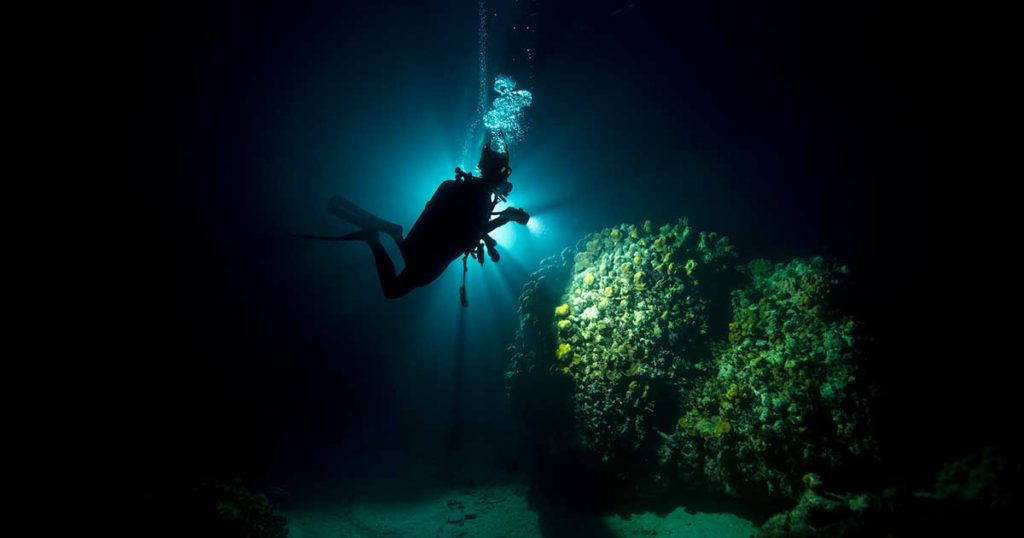Why dive at night? Because doing so allows you to enjoy some unforgettable encounters and see the underwater world in a way you can’t experience during the day. Here are just some of the things that make night diving special.
They only come out at night
Many aquatic creatures are nocturnal. So while we poke around in broad daylight, they may be buried deep in the reef taking a snooze. The list of reef creatures you may only see out and about at night includes:
- Squirrelfish
- Porcupine Fish
- Scorpionfish
- Snappers
- Moray Eels
- Octopus
- Tube worms
- Coral polyps
Granted, you may see some of these creatures during the day but they will likely be squirreled away, deep within the recesses of the reef. At night they will tend to be be much more active. Some will even swim with you.
Coral polyps, in particular, are nighttime feeders. Where something like a brain coral may appear to be little more than a colorful rock, at night you will see its polyps emerge to feed in the current. The same goes for some tube worms who may be all but invisible during the day.
…and some don’t
Most fish are like humans. They need their beauty sleep. But, because fish lack eyelids, it may be hard to tell when a fish is out cold other than the fact it is remaining very, very still.
A notable exception are most parrotfish species. After ensconcing themselves under rocky ledges, most parrotfish will extrude a translucent cocoon that envelops their entire body. This helps protect them from predators.
It glows in the dark
Yet another underwater phenomenon you may encounter at night is bioluminescence. These are clusters of tiny marine organisms that literally glow in the dark.
To experience bioluminescence, you and everyone with you must extinguish your dive lights. Even then, you may need to move your hands around to get bioluminescence creatures to light up.
Bioluminescence is not a prevalent phenomenon. Nevertheless, when you do encounter it, it is unforgettable.
Optimal times for night diving
There are two distinct times when night diving is at its best. These are dusk and several hours afterward.
- The reason for diving at dusk is that it allows you to experience the transition in animal behavior between night a day. Dusk diving is also recommended for those new to night diving.
- With experience, you will most likely enjoy night diving several hours after dark. At this point, all of the nocturnal animals will be out and about, exhibiting their unique behaviors.
The weather is better
Although weather is always highly variable, in general, sea conditions are generally calmer at night dive. This can mean less in the way of wind, waves and currents. Where there may have been raging surf during the day, the same spot can be surprisingly placid at night.
Beach diving skills are essential
Although there is no reason why you cannot night dive from a boat, the fact remains that few dive operators offer night diving charters. Therefore, if you want to go night diving, you will most likely need to go off the beach.
This is one of the many reasons we ensure our students are all proficient at beach diving. It greatly expands the options available to them.
Not a do-it-yourself proposition
There is a lot more to night diving than just grabbing a dive light and going. Night diving requires a lot in the way of specialized knowledge and skills that you do not want to learn through trial and error.
This is why formal Night Diver training is essential. For more information, visit our website or call or visit the store. — © 2021 • Sinulogic LLC


